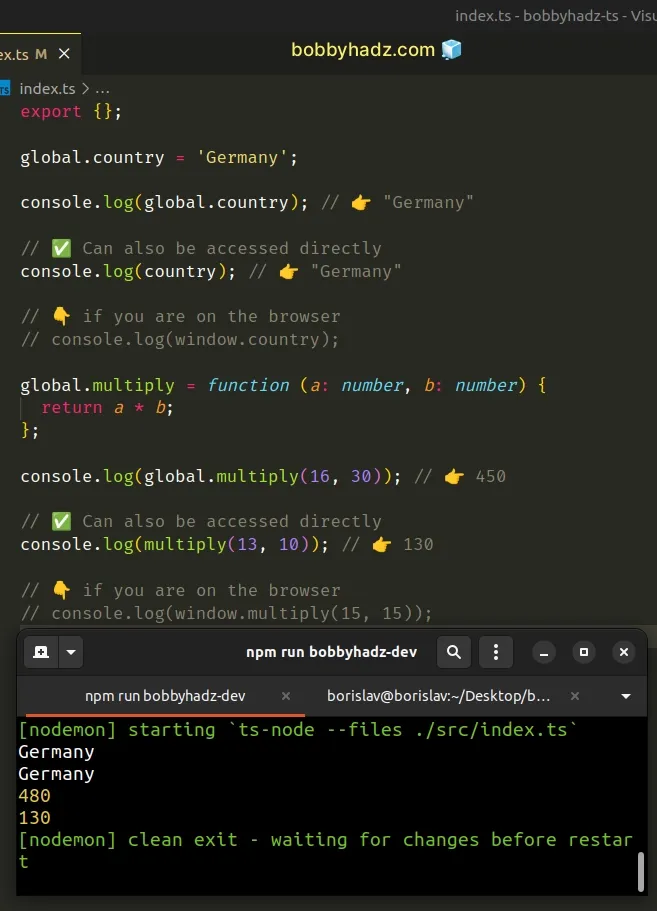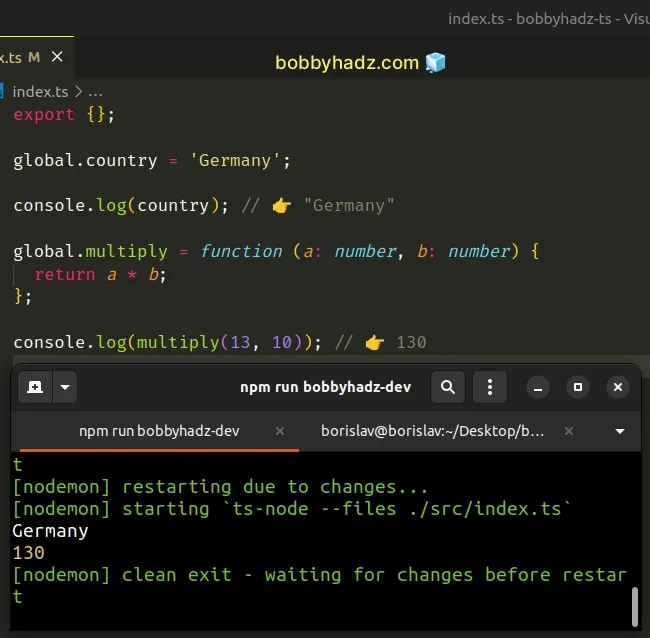How to declare Global Variables in TypeScript
Last updated: Feb 28, 2024
Reading time·4 min

# Declare Global Variables in TypeScript
To declare a global variable in TypeScript, create a .d.ts file and use
declare global{} to extend the global object with typings for the necessary
properties or methods.
TypeScript looks for .d.ts file in the same places it looks for your regular
.ts files.
In your src directory, create a types directory that contains the following
index.d.ts file:
/* eslint-disable no-var */ declare global { var country: string; function multiply(a: number, b: number): number; } export {};
The example shows how to extend the global object with a country property that
is a string and a multiply function.
Make sure to use the var keyword to add typings for properties you intend to
set and use in other files.
You need to add the names and types of all of the properties you intend to
access on the global object.
# Turning off type checking for specific properties
For example, if you don't know the type of the specific property and want to
turn off type checking, set it to any.
/* eslint-disable no-var */ declare global { var country: any; // 👈️ disables type checking for property function multiply(a: number, b: number): number; } export {};
Now, I'm able to set and access the specified property on the global object if
using Node.js or on the window object if in the browser.
global.country = 'Germany'; console.log(global.country); // 👉️ "Germany" // ✅ Can also be accessed directly console.log(country); // 👉️ "Germany" // 👇️ if you are on the browser // console.log(window.country); global.multiply = function (a: number, b: number) { return a * b; }; console.log(global.multiply(16, 30)); // 👉️ 450 // ✅ Can also be accessed directly console.log(multiply(13, 10)); // 👉️ 130 // 👇️ if you are on the browser // console.log(window.multiply(15, 15));

# Solve ts-node related issues
Note that you might still be getting an error in your terminal if you are using ts-node.
The problem is with ts-node not recognizing local
declaration files.
To resolve the issue, use the --files flag with your ts-node command, so
instead of ts-node ./src/index.ts you should run
ts-node --files ./src/index.ts.
I use nodemon with ts-node and here are the contents of my nodemon.json
file.
{ "watch": ["src"], "ext": ".ts,.js", "ignore": [], "exec": "ts-node --files ./src/index.ts" }
After adding the --files flag (only required if using ts-node), restart your
server and you should be good to go.
# Properties are accessible on the global and window objects
Note that this makes the multiply function and the country property
accessible directly (globally) and on the
global (Node.js) or window (Browser) objects.
global.country = 'Germany'; console.log(country); // 👉️ "Germany" global.multiply = function (a: number, b: number) { return a * b; }; console.log(multiply(13, 10)); // 👉️ 130

If you try to access a property that you haven't explicitly added to your
declare global {} object, you'd get an error:
// ⛔️ Error: global.hello = 'bobbyhadz.com';
# Add the path to your types directory to your tsconfig.json
If you still get an error in your IDE, try adding the path to your types
directory to your tsconfig.json file.
{ "compilerOptions": { // ... rest "typeRoots": ["./node_modules/@types", "./src/types"] } }
We used the export {} line in our index.d.ts file to mark it as an external
module. A module is a file that contains at least 1 import or export
statement. We are required to do that to be able to augment the global scope.
index.d.ts file according to your use case.TypeScript looks for .d.ts files in the same places it looks for your regular
.ts files
The location is determined by the include and exclude settings in your
tsconfig.json file.
# Using a type assertion
If you can't get this to work, try using a type assertion for a quick and dirty solution.
// 👇️ or (global as any) if you are in Node.js (window as any).example = 'bobbyhadz.com'; console.log((window as any).example);
This approach should only be used when nothing else works as it is quite
annoying to have to type the window or global object as any every time you
need to access a property.
I've also written a detailed guide on how to declare global types in TS.
You might also use a more direct approach when declaring global variables.
# Using a more direct approach to declare global variables
Here is an example that doesn't use the declare global syntax.
/* eslint-disable no-var */ /** * IMPORTANT: 👇️ * file should not have imports or exports */ declare var country: string; declare function multiply(a: number, b: number): number;
The file directly declares a country and multiply global variables.
Note that the .d.ts file should not contain any imports or exports, otherwise,
you'd have to use the declare global{} syntax from the previous code samples.
Now you can set and access the global variables in your code.
global.country = 'Germany'; console.log(country); // 👉️ "Germany" // 👇️ if you are on the browser // console.log(window.country); global.multiply = function (a: number, b: number) { return a * b; }; console.log(multiply(13, 10)); // 👉️ 130
If you need to extend the Window type, check out the following article.
I've also written an article on how to extend Array.prototype in TS.
# Additional Resources
You can learn more about the related topics by checking out the following tutorials:

